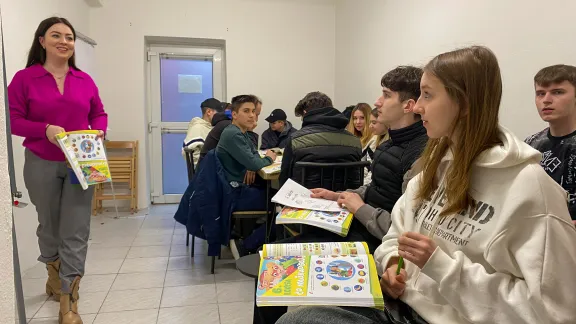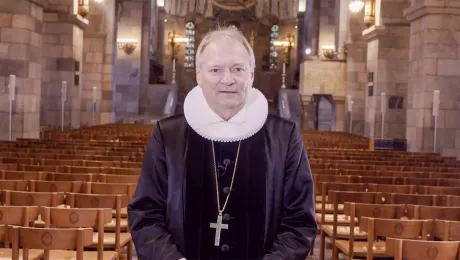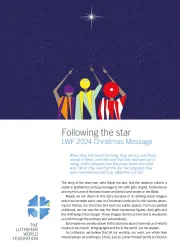
Students attend language classes in Nitra, Slovakia. Photo: LWF/ R. Meissner
"Prayer and action go hand in hand”
(LWI) - "I like Slovakia. I am learning the language to make friends and have a good life, that means a home, a family and friends". Jeremias has only recently learned to express himself in the Slovak language. A refugee from Ukraine, the young man is attending language classes as part of a local integration initiative implemented by the Evangelical Diakonia of the Evangelical Church of the Augsburg Confession (ECAC) in the Slovak Republic and supported by the Lutheran World Federation (LWF).
Overwhelming hospitality
When the full-scale war in Ukraine started in February 2022, the Slovak Republic received more than half a million refugees. People opened their homes; churches provided accommodation, food, and transport to the families fleeing the neighboring country. Overwhelming hospitality and care greeted the people displaced by war. The ECAC, and its diaconal agency are among the many actors providing support.
Two years later, government support for refugees from Ukraine has been cut, especially the support for accommodation. ECAC and the Slovak Diakonia are trying to fill a widening support gap. Local integration is key to breaking people's dependency on government aid.
Addressing inequality and trauma
The project “Empowering refugee children in Slovakia” is funded by LWF and implemented by ECACS and the Slovak Diakonia. It addressed the situation from a holistic perspective, focusing on support for children and caregivers alike. The objectives were equal access to education, community settlement for children, empowering caregivers, usually mothers in a single-parent role, and addressing trauma, says the Director of the Evangelical Diakonia of ECAC in Slovakia Ľubica Szabóová Vysocká. The project ran from August 2023 to June 2024.
The team organized tutoring and therapeutic-driven educational services to balance out the disadvantages which the refugee children had in public schools. In addition to language courses in Slovak, the project also provided education in the Ukrainian mother tongue to help the children retain their identity. Community leaders and church representatives engaged the parents and families in group activities.
Hand in hand with the support of education goes the prevention of social isolation, problematic behavior, psychological problems and inequalities in the school environment and in society.
Ľubica Szabóová Vysocká, Director of the Evangelical Diakonia of ECAC in Slovakia
“The discussions with the mothers focused on the importance of bringing children to the local schooling system, and how to deal with local public institutions. We provided information about the role of the social and health systems and advised them on how to return to normalcy in the hosting society,” Szabóová Vysocká elaborates.
Four months later, most parents confirmed that their children were much more confident in dealing with schoolwork. "I am so glad I met good people," a child from Martin says. "I would advise everyone in my situation to learn the language and make friends here."
Almost 300 children in seven communities attended Slovak classes, and 200 children aged below ten received Ukrainian language instruction. Szabóová Vysocká states in her final report that nearly 500 children were tutored in specific subjects like physics, math, and chemistry, received help with following online classes and attended after-school consultations. Hundreds of mothers participated in art therapy and trauma counseling and now find themselves in a position where they can look ahead and actively plan their future, Szabóová Vysocká summarizes.
“Hand in hand with the support of education goes the prevention of social isolation, problematic behavior, psychological problems and inequalities in the school environment and in society. Some of these phenomena manifest only later in the quality of life of the children, but also our society and the communities in which we live together,” she adds.
Learning from the past
Rebekka Meissner, LWF Program Executive for Member Church Projects, highlights the role of ECACS congregations in the project and the overall refugee response. "The town would have struggled on its own, as it needed to wait for direction from the state, while the church and civil society were able to start immediately. Taking initiative was so important, as the city disaster manager was only trained for the breaking of the dam and had no idea how to approach this situation," she recalls.
"Those congregations were active and spiritual; prayer and action went hand in hand," she adds. "They had learned from the "Velvet Revolution" in Slovakia in 1989 when a movement was needed to drive change. The lives of many coordinators from the congregations were also changed through this diaconal work; it would be worth writing a book about everything they learned and experienced".


